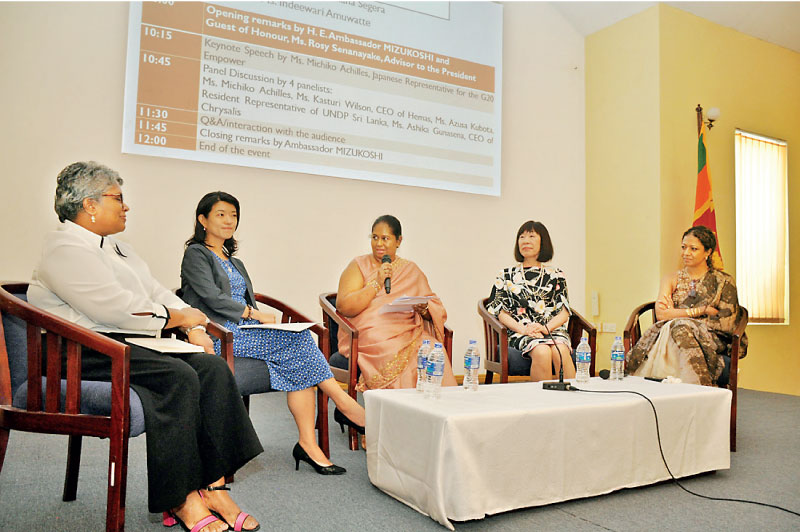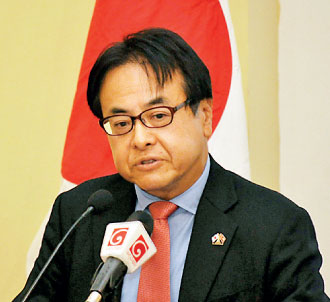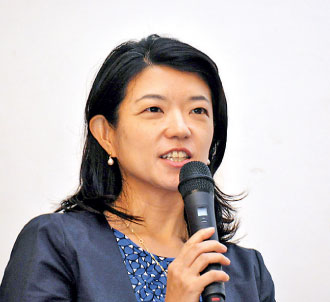Wednesday Feb 25, 2026
Wednesday Feb 25, 2026
Friday, 11 August 2023 00:57 - - {{hitsCtrl.values.hits}}

WIM Founder Dr. Sulochana Segera moderates the panel discussion
By Divya Thotawatte
 |
| Japanese Ambassador to Sri Lanka Mizukoshi Hideaki |
 |
| G20 Alliance Japanese Representative Michiko Achilles |
 |
| UNDP Resident Representative in Sri Lanka Azusa Kubota |
 |
| Former Mayor of Colombo Rosy Senanayake |
 |
| Chrysalis CEO Ashika Gunasena |
 |
| Hemas Holdings Group CEO Kasturi Chellarajah Wilson
|
It is necessary to normalise seeing women’s faces in leadership roles for public and professional attitudinal change for the better implementation of policies of gender equality in workspaces, said experts at a seminar recently.
The seminar was a first-time collaborative event by the Embassy of Japan in Sri Lanka and Women in Management (WIM), aiming to shed light on the challenges and good practices of women’s economic empowerment and participation in decision-making processes of society.
Former Mayor of Colombo Rosy Senanayake, the guest of honour at the event, said, “the international community has placed great emphasis on gender mainstreaming which aims to reflect gender perspective in all policies and systems. It is something that Sri Lanka should also endeavour because it is much-needed in the country.”
Speakers at the seminar discussed how both in Sri Lanka and Japan gender equality policies in the workplace are increasingly formed and established in government, corporate and official levels. Yet, issues and obstacles for implementation arise due to attitudinal problems of working women themselves, co-workers or/and the public, where women allowed at the top are a significant few compared to men in leadership roles.
UNDP Resident Representative in Sri Lanka Azusa Kubota said, “Gender equality has to be at the core of everything we do and Sri Lanka is moving in the right direction. It looks good on paper but implementation has to follow.” She noted, when a country introduces temporary special measures that support women’s leadership, it increases the number of women in Parliament and decision-making positions which would lead to more women at the top.
Kubota explained that the cause for attitudinal problems that obstruct the implementation of gender equality in the workplace and hinder women’s growth in their careers is due to the public’s lack of familiarity with women leaders. She said, as a solution, female leadership should be normalised. There are women leaders, but men are conventionally the faces of leadership. If faces of women leaders are publicised and supported more, promotion of women in the workplace, the respect for women leaders and trust in their leadership and skills could be improved, she observed.
Chrysalis CEO, Ashika Gunasena displayed similar sentiments pointing out, “We empower women, train women, build capacity, but we don’t necessarily address why the playing field is unequal in the first place. It is not to do just with empowering women, but we need to engage with other stakeholders like men to challenge these social norms and policies, because though evidently Sri Lankan policy framework is good, it doesn’t translate into action.”
Japanese Ambassador to Sri Lanka Mizukoshi Hideaki also commented on the slow but steady implementation of women’s empowerment policies creating opportunities for women leaders and employees within the Japanese workforce. He said, the economic empowerment of women in Japan is improving despite the process lacking swiftness, especially when it comes to promoting women to leadership positions.
“It is also true with the Japanese foreign ministry in which I have been working for nearly forty years. When I entered the ministry there was only one lady in my batch. Now, roughly half the new recruits are women, which is a big change. However, at the level of Ambassadors, there are only five Japanese female Ambassadors around the globe. This means gender equality at the level of entry into professional society has improved, yet there are many obstacles in rising up to leadership level,” he explained.
Delivering the keynote address at the seminar G20 Empower (The G20 Alliance for the Empowerment and Progression of Women’s Economic Representation) Japanese Representative Michiko Achilles, the keynote speaker discussed the history of Japan’s policies that led to the growth of gender equality within the workforce. She said both government and corporate sectors have witnessed the improvement of gender equality in various professions, and more women are employed in the corporate sector. Furthermore, leadership positions for women came with certain obstacles and challenges.
She shared her insights in navigating and managing the challenges faced by a career woman. She spoke on her work as a female professional in positions of leadership throughout her career. She stressed the importance of building interpersonal relationships in the workplace which would allow one to utilise workplace challenges to one’s advantage.
Achilles explained that problems in a woman’s career may arise from co-workers and even superiors who feel threatened or uncomfortable with a female leader.
She underscored the following points in her advice to female workers:
“1. Understand your boss; what he is good at and what he is afraid of. Help him achieve and let him help you achieve.
2. Set a clear goal and enable your team to perform. Be open to their ideas and help as needed.
3. Imagine what is in your CEO’s mind and take an educated risk of telling him what you think. CEOs may not have people around to have open and honest conversations.
Hemas Holdings PLC Group CEO Kasturi Chellarajah Wilson also spoke about her experiences as a leader and a working woman highlighting that motivation and passion for doing her best at everything was a necessary element in her success. “I learnt very early in my career that it is important to be who you are and know your personality and what you bring to the table. I was comfortable with it, so I took the risks and learnt to succeed and unlearn and learn everything, which will lead you to new roles and career growth,” she added.
Pix by Lasantha Kumara